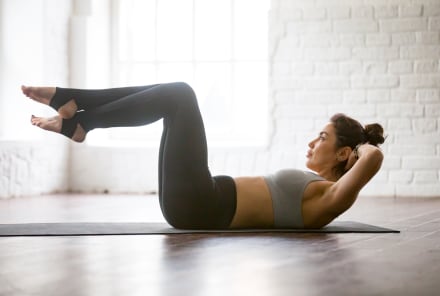Advertisement
Is Your Workout Messing With Your Hormones?


If you've ever experienced symptoms like prolonged bloating, fatigue, mood swings, or trouble concentrating, you've probably dealt with hormone imbalance at some point in your life. While out-of-whack hormones can be caused by any number of factors, exercise can unfortunately be one of them.
Not all workouts are created equal, of course, and some exercise methods are harder on our hormones than others. Here's exactly what you need to know if you want to keep your hormones in balance.
Exercise and your hormones.
First things first: For the most part, exercise is actually really good for your hormones. The problem arises when you overdo it. "When exercise becomes excessive, the body loses its ability to produce adequate energy," explains Jacob Teitelbaum, M.D., an expert on chronic fatigue. "When that occurs, you can see hypothalamic pituitary suppression, which can lead to fibromyalgia. Severe insomnia is a good warning sign for this, along with weight loss and losing one’s menses. In addition, in people who are undergoing excessive stress, excessive exercise can cause more stress on the adrenal glands. The hallmark of this is irritability when hungry, along with low blood pressure."
Runners, CrossFitters, and HIIT enthusiasts: Beware.
While workouts like running, CrossFit, and HIIT are great for hormone balance in moderation, running two marathons in one year could wreak havoc on your hormones. "The most common imbalances I address are thyroid conditions, adrenal fatigue, and PCOS. For these, we want to offer the body a state of healing, and the excess adrenaline and cortisol spikes with workouts such as HIIT, cardio, and marathon running may wreak havoc on the delicate balance that your body may be trying to achieve," explains Thyroid Yoga founder and mbg class instructor Fern Olivia.
Integrative medicine expert Dr. Taz Bhatia, M.D., adds that intense cardio workouts can be especially hard on women's hormones. "The adrenaline output and physical demand on joints given the difference in female anatomy trigger more wear and tear, cortisol imbalances, and thyroid dysfunction," she explains.
Workouts for hormone balance.
Now that you've gotten the bad news, here's the good news: Some forms of exercise are extraordinarily good for your hormones. "Balance is key," says Dr. Taz. "Alternating yoga or Pilates with swimming, cardio, and weights can protect the adrenals and balance hormones. Also, don't forget to rest: Gentle movement and stretching are as important in an exercise routine as burning calories. I can't recommend gentle movements like tai chi and qigong enough."
Fern Olivia also recommends gentler forms of exercise to keep your hormones in check. "I'd go for light movement like yin yoga, kundalini yoga, tai chi, qigong, hiking, light yoga, and thyroid yoga," she says.
And if you need a quick fix, Dr. Teitelbaum suggests getting back to basics. "Increase your salt and water intake," he says. "It's great for adrenal support."
Want more ideas for balancing your hormones? Here are 10 ways to lower inflammation and balance hormones naturally.

Short On Time? Try This Personal Trainer's 5-Minute Full-Body Workout
Krista Stryker, NSCA-CPT

Short On Time? Try This Personal Trainer's 5-Minute Full-Body Workout
Krista Stryker, NSCA-CPT

Short On Time? Try This Personal Trainer's 5-Minute Full-Body Workout
Krista Stryker, NSCA-CPT

Short On Time? Try This Personal Trainer's 5-Minute Full-Body Workout
Krista Stryker, NSCA-CPT









